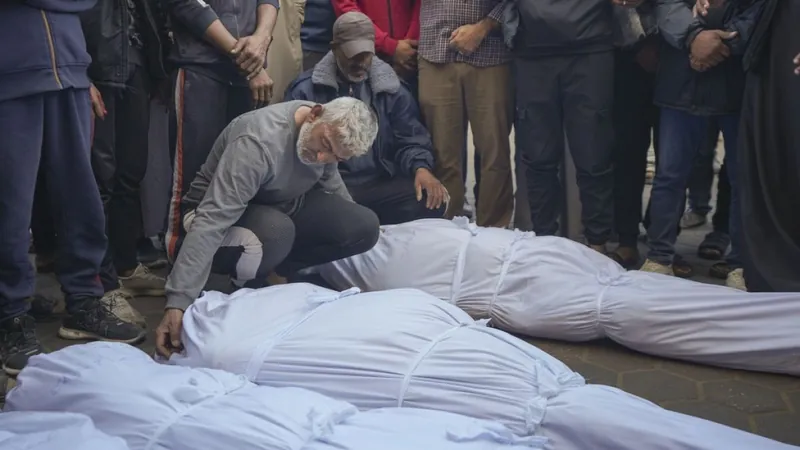
Pope Francis Urges Investigation into Potential Genocide in Gaza Amid Ongoing Conflict
2024-11-17
Author: Ying
Pope Francis Calls for Investigation
In a historic declaration, Pope Francis has called for a thorough investigation into whether the Israeli military actions in Gaza could be classified as genocide. This notable stance comes amid heightened tensions and ongoing warfare in the region, marking the first time the Pope has openly addressed allegations of genocide related to Israel's military operations.
Legal Definitions and Humanitarian Concerns
In remarks published by the Italian daily La Stampa, Francis stated, 'According to some experts, what is happening in Gaza has the characteristics of a genocide.' He emphasized the importance of a careful review to see if the situation aligns with the legal definitions outlined by international law and jurists.
Previous Criticism of Israeli Actions
The Pope’s comments come after he criticized Israeli attacks in Gaza and Lebanon earlier this year, labeling them 'immoral' and excessively disproportionate, asserting that they exceed the established rules of warfare. His vocally balanced approach highlighted the suffering of both Israelis and Palestinians, which he articulated after meeting families of hostages taken by Hamas, as well as Palestinian civilians.
Escalating Conflict and Casualties
In the backdrop of these developments, the conflict continues to escalate. Recent Israeli airstrikes have led to significant casualties, with numerous reports stating that attacks in Beit Lahiya claimed dozens of lives. The Gaza Health Ministry has reported the staggering toll of approximately 43,800 Palestinian fatalities due to the war, with many of these being women and children. These casualties represent the devastating humanitarian crisis unfolding as about 90% of Gaza's population of 2.3 million has been displaced, and vast areas of the territory have been significantly damaged or destroyed.
Recent Trigger of the Conflict
The conflict reignited after the brutal assault by Hamas on October 7, 2023, which left around 1,200 Israelis dead, mostly civilians, alongside the abduction of 250 individuals. The ongoing conflict raises serious questions about war ethics, humanitarian law, and the call for peace in a region long marred by violence.
Domestic Scrutiny on Israeli Leadership
Adding another layer of complexity, Israel's Prime Minister Benjamin Netanyahu is facing intense domestic scrutiny following months of protests regarding his handling of the crisis since the Hamas attack. Criticism has been directed at him for perceived security lapses, and the tense climate has even resulted in incidents like flares being fired at his private residence—a stark reflection of rising discontent and a call for renewed political discussions.
Demand for Ceasefire and Political Action
Opposition figures and critics continue to challenge Netanyahu’s administration, urging immediate action for a ceasefire in order to facilitate the release of hostages still held by Hamas. The recent flare incident is being interpreted through the lens of increasing societal tensions, as prominent political leaders explore the implications for Israel's democratic structures.
Global Response and Hope for Resolution
As this humanitarian crisis progresses, the world watches closely. The Pope's call for investigation resonates with a growing need for accountability, and as international discourse around Gaza intensifies, the hope for a diplomatic resolution seems more crucial than ever.


 Brasil (PT)
Brasil (PT)
 Canada (EN)
Canada (EN)
 Chile (ES)
Chile (ES)
 España (ES)
España (ES)
 France (FR)
France (FR)
 Hong Kong (EN)
Hong Kong (EN)
 Italia (IT)
Italia (IT)
 日本 (JA)
日本 (JA)
 Magyarország (HU)
Magyarország (HU)
 Norge (NO)
Norge (NO)
 Polska (PL)
Polska (PL)
 Schweiz (DE)
Schweiz (DE)
 Singapore (EN)
Singapore (EN)
 Sverige (SV)
Sverige (SV)
 Suomi (FI)
Suomi (FI)
 Türkiye (TR)
Türkiye (TR)